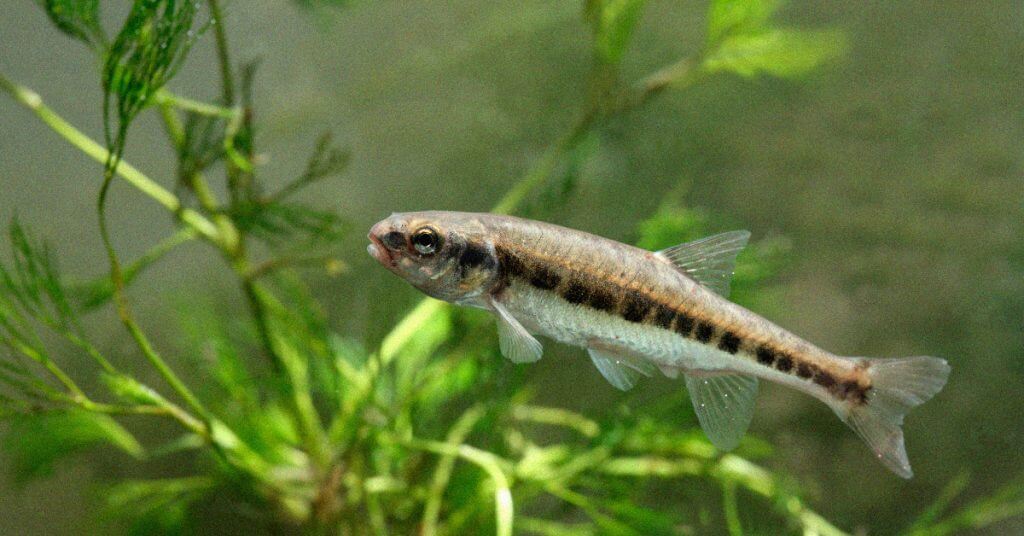It’s not too often we get the opportunity to talk about a rare fish nevermind a hybrid blend of two. The mean mouth bass is a largemouth smallmouth hybrid that’s about as difficult to catch as it is to find.
Because it’s so hard to find it’s led many anglers to wonder if it exists at all.
I’m here to tell you, it sure as heck exists and many anglers flock to certain areas of the country like Texas to find them.
In this guide, I want to help you understand what the mean mouth bass is, why they call it that, and how you can hook one for yourself.
What is a Mean Mouth Bass?

A mean mouth bass is spawned from a smallmouth and spotted bass mating. While many people refer to this fish as a largemouth bass hybrid, it actually isn’t.
The reason is because largemouth and smallmouth bass have two completely different habitats and are almost never around each other.
In fact, smallmouth and spotted bass aren’t usually in the same areas either which is part of what makes these fish so rare.
There are a few areas of the country where spotted and smallmouth cross paths.
Why Are They Called Mean Mouth?

Interestingly enough, there isn’t a reason. This species doesn’t have a biological classification so they’re not even recognized as a fish by scientists.
Mean mouth is more of a nickname but it comes due to the aggressive nature of a smallmouth.
The reason I believe they’re not considered a species is because the spawning habits are so inconsistent. They don’t have a ritual bass spawn every year like a lot of other fish species.
Instead, they basically spawn whenever so the interaction between the two is so rare and unusual that it hasn’t been deemed necessary to classify the fish as its own species.
Where to Find Mean Mouth Bass?

There are only three states currently known for having hybrid mean mouth bass and they’re Texas, Missouri, and Georgia.
Missouri reported one in Table Rock Lake. It was a five pound bass. The largest mean mouth ever reported was a 7.9 pounder in O.H. Ivie Reservoir in Texas.
The Texas Parks and Wildlife reported this freshwater bass caught as a state record. The black bass was caught by Wyatt Frankens.
Since they’re so rare I wouldn’t plan a trip around trying to find them and in fact, you may not even realize if you catch one unless you’re paying close attention and looking out for them.
They’re not as common as largemouth, catfish, crappie, striped bass, or walleye.
The main difference that allows you to tell them from a smallie is that their mouth is much larger and they have a spotted bass pattern. Instead of having a straight line on their side, they have spots on the top with a mixed pattern.
It’s believed that you can find them near rocky areas along dams. This is similar to where you’d find smallmouth so I would expect to look near moving water as well.
How to Catch Them

It’s like trying to find a needle in a haystack but I’d suggest going with whatever you’d use for smallmouth. Smallmouth bass generally prefer bass jigs or soft plastic lures so go with that.
You’ll want to be incredibly precise when choosing your location as well. Sit near tributaries where rivers and streams flow into larger bodies of water.
Cast in clear areas, rocky bottoms, and rocky peaks. It’s believed that these fish prefer these environments to heavy structure.
Why Do The Two Species Mate?
This is an age-old question that we may never have a true answer to. The best research was actually performed by In-Fisherman about 10 years ago.
They believe it’s because of the smallmouth’s aggressive behavior. Anytime there is the existence of a hybrid species, it’s always smallmouth bass because they instigate it.
Here’s what the experts had to say:
“The term “mean mouth bass” was born when Childers observed a school of largemouth-smallmouths attacking a female swimmer.
“The bass leaped from the water and struck her on the head and chest,” he wrote, “and drove her from the pond.” On another occasion, he watched mean mouths attack a dog that ventured into shallow water.
In nearly all cases of hybridization outside the lab, smallmouth have been involved. Geneticist Dr. Dave Philipp, colleague of the late Dr. Childers noted that fertilization of largemouth bass eggs with smallmouth sperm resulted in more successful crosses than the reciprocal cross (largemouth male and female smallie).
The aggressive male smallmouth bass may be an instigator when introduced into waters outside its natural range where spawning sites are limited, or in altered habitats such as reservoirs.”
Final Thoughts
It’s interesting to note that hybridization is not exclusive to these two. Smallmouth bass are also known for breeding with red eye bass in the southern states as well.
Clearly it’s a smallie issue but if you’re up for a wild goose chase, consider targeting the mean mouth if you’re bass fishing in Texas, Missouri, or Georgia. Good luck out there!




